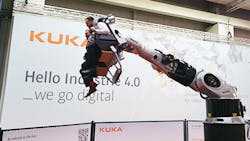Midea Group Co. is seeking to raise its stake in Kuka AG to become the industrial robot maker’s largest shareholder in a deal that values the German company at 4.6 billion euros ($5.19 billion) and illustrates a surge in Chinese investment in Europe.
Midea is offering 115 euros a share ($129.78), contingent on it being able to raise its holding to at least 30% from an indirect 13.5% stake held now, it said in a statement Wednesday. In doing so, Midea would jump ahead of German industrial equipment-maker Voith Group in shareholder rankings. Kuka said its boards would evaluate the offer.
Kuka shares were trading 30% higher at 109.80 euros ($123.91) at 11:55 a.m. in Frankfurt. The offer price is a 36% premium to Kuka’s closing share price of 84.41 euros ($95.26) Tuesday and a 60% premium to what both companies called Kuka’s “unaffected” closing share price on Feb. 3, just before Midea almost doubled its holding to 10%.
The Chinese offer caps a period of takeover speculation around Kuka, which is based in Augsburg and competes with Switzerland’s ABB Ltd. and Japan’s Fanuc Corp. in the market for industrial robots. CEO Till Reuter has said in the past that Midea would help open up the lucrative Chinese market for the maker of orange mechanical arms that counts Airbus Group SE, Volkswagen AG and Fiat Chrysler Automobiles NV as its customers. China’s biggest maker of home appliances is seeking to upgrade factories and cut dependence on workers, which are becoming more expensive.
This latest move comes as China National Chemical Corp., known as ChemChina, is seeking approval for a $43 billion takeover of Swiss seed company Syngenta AG in what would be the biggest acquisition by a Chinese firm. It also agreed to buy German machinery-maker KraussMaffei Group in January in a deal valued at $1 billion.
“We don’t plan to wholly acquire Kuka; what we want is to be a meaningful shareholder,” Midea chairman Paul Fang said in an interview. “Under German conditions, this would be to have a stake of 30%, that’s why we had this condition. No matter how big a stake Midea holds, Kuka will be an independent company and we don’t plan to interfere in their independence."
Midea has made its own decisions on the transaction and hasn’t “had any communication or directions from the government,” he said.
Kuka said in a separate statement it will issue a “reasoned opinion” on Midea’s offer. In addition to Midea, the company has German entrepreneur Friedhelm Loh and Swoctem GmbH with 10% and Voith with 25% as large shareholders, according to its website.
“The offer price is highly attractive,” Equinet Bank analyst Holger Schmidt wrote in a note raising the share price target to 125 euros ($141.07) each with an “accumulate” rating. Midea is likely over time to target a full takeover, requiring the convincing of Voith Group, which holds a blocking minority, he said.
Kuka has expanded its Asian presence in recent years, opening a Shanghai factory in 2013 and increasing its China headcount. It’s already helping Midea to automate its factories, Reuter said in March.
“Midea wants to build smart factories that use less labor to produce smart appliances, as China’s working population is dropping and they need to adjust to higher labor costs,” Yuanta Securities Co. analyst Juliette Liu said. “The company intends to use Kuka to establish a dominance over industrial robotic manufacturing techniques in China.”
Midea wants to transform its manufacturing line with technology and is aiming to cut its workforce by a fifth by 2018 to 80,000, Midea’s Fang said in the interview. The company already has 100 Kuka robots in its factories.
With $10.7 billion in free cash, Midea could do more acquisitions, although it intends to focus on expanding its brand in Europe and America, he said.
“We are already strong in China,” he said, “but the focus is now on establishing a truly globalized brand.”
By Daryl Loo and Vinicy Chan, with assistance from Thomas Mulier, Alice Baghdjian and Carolynn Look
About the Author
Bloomberg
Licensed content from Bloomberg, copyright 2016.
